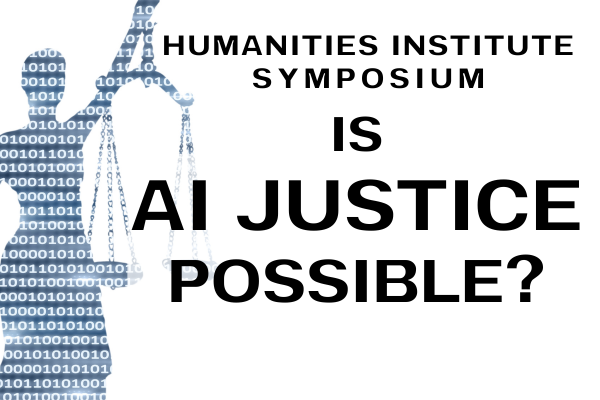
Is AI Justice Possible?
A Symposium Sponsored by the Humanities Institute and the College of Arts and Sciences
As part of the joint project on Artificial Intelligence in Engineering and Arts & Humanities, the Humanities Institute is proud to announce this upcoming symposium—Is AI Justice Possible?
This symposium was prompted by a discussion conveyed by the deans last fall among faculty from the College of Engineering and the College of Arts & Sciences. The theme of AI Justice emerged from it as a topic that could evoke interesting and provocative statements from scholars, artists, and engineers from across the country. With the organizing help of Richard Samuels (Philosophy) and Kris Paulsen (History of Art), six speakers have been invited to address our theme from their different perspectives in two sessions.
Any project that is committed to merging the goals of Arts practice and Humanities research with the productive potential of artificial intelligence must address the most fundamental question at the heart of such a project: is a just artificial intelligence possible? Given the long and elliptical moral arc of human history, can artificial intelligence help to bend it toward justice? Can machines learn how to promote social equity and just outcomes without generating unintended consequences that cause more damage than they rectify? And if so, what steps might be taken towards realizing this goal? Our goal is to stimulate discussion among scholars across multiple fields that might result in a set of principles that could guide future research.
RSVP here.
This event is free and open to the public. Parking is available in the Ohio Union South Garage, directly north of the Ohio Union.
Sessions and Order of Presentations
Morning Session: 10:00-12:00
Nancy Ettlinger, professor of Geography, will moderate the morning panel with the following speakers:
Roman Yampolskiy, Associate Professor of Computer Engineering and Computer Science at the University of Louisville, will present "Artificial Intelligence Safety and Security." His abstract: Many scientists, futurologists and philosophers have predicted how AI will enable humanity to achieve radical technological breakthroughs in the years ahead. In his talk, Dr. Yampolskiy will cover current progress in artificial intelligence and predicted future developments, including artificial general intelligence. The talk will address some obstacles to progress in development of safe AI as well as ethical issues associated with advanced intelligent machines. The problem of control will be covered in the context of safety and security of AI.
Wai Chee Dimock, Professor Emeritus of American Studies and English at Yale University, will present "AI for Climate Justice." Her abstract: "AI for Climate Justice" begins with AI conservation in the Amazon, focusing especially on the partnership between the Tembé tribe and the San Francisco nonprofit Rainforest Connection, using upcycled cell phones to monitor illegal logging. I will discuss the ReefOS platform of the Coral Gardeners in Mo'orea, French Polynesia, used to monitor the health of transplanted, heat-resistant super corals.
Mashinka Firunts Hakopian, Associate Professor in Technology and Social Justice at ArtCenter College of Design, will present a ten-minute critical presentation contextualizing her book, The Institute for Other Intelligences (X Artists' Books, 2022) followed by a 20-minute performative reading from the book. Her presentation, titled "Dispatches from the Institute for Other Intelligences," adapts the text of The Institute for Other Intelligences in a lecture-performance delivered by the director of a fictive institute for training feminist bots and “artificial killjoys.” Set in an indeterminate future, the lecture unfolds against the backdrop of a symposium where machine intelligences convene annually for curriculum on algorithmic equity. Drawing on feminist, queer, and critical media scholarship, its “algorithmic bias training” aims to deploy the radical operations of speculative learning machines from the future toward alternative outcomes in the present. Refusing models of AI as a “view from nowhere,” the director embodies sociotechnical systems whose ways of knowing generate oppositional automata. With a score by Lara Sarkissian.
Afternoon Session: 2:30-4:30
Morgan Liu, associate professor and chair of Near Eastern and South Asian Cultures will chair the afternoon panel with the following speakers:
Motahhare Eslami, Assistant Professor of Software and Social Systems at Carnegie Mellon University, will present "(Ir)responsible AI: Revisiting Transparency and Fairness Efforts in AI Systems." Her abstract: The considerable power, obscurity, and potential biases inherent in algorithmic systems have sparked novel research fields focused on imbuing these systems with transparency, fairness, and accountability. In this panel, I intend to reexamine these avenues of study, and contend that while they are indispensable for fostering responsible algorithmic systems, innovative perspectives become essential when these efforts fail to achieve their objectives. I will specifically highlight the importance of algorithmic literacy and public education, along with the empowerment of everyday users in understanding and discerning potentially harmful algorithmic behaviors. Such steps are paramount to enable users to make more informed decisions when interacting with algorithmic systems.
Amelia Winger-Bearskin, Associate Professor of Artificial Intelligence and the Arts, at the Digital Worlds Institute at the University of Florida, will present her talk, "AI Creation Story." Her abstract: Creation stories are essential to all cultures because they embed values, scientific know-how, and tools for future generations. Creation stories are unique kinds of stories because they do not simply provide an account of why the world is the way it is. They also orient us toward possible futures that exist in accordance with our values as a society and produce a foundation upon which we can build a shared civilization. What are the creation stories we tell ourselves and our students about AI? Why does this matter, and what is at stake?
Mathias Risse, Professor in Human Rights, Global Affairs and Philosophy and Director of the Carr Center for Human Rights Policy at Harvard University, will present "A Joint Pursuit of Justice – With Artificial Intelligence?" His abstract: Is AI-Justice possible? I will interpret this question as ‘is it even conceivable that we will live together with AI in a society and jointly pursue an ideal of justice.’ This is obviously a highly speculative topic, but also not one about which we should start thinking when we know concretely that the scenario will be upon us. I will share some thoughts of what AI would need to be like for that to be possible, and for how humans would need to adjust, but will then also suggest that the contemporary understanding of public reason associated with John Rawls and others offers a good starting point for making sense of a shared pursuit of justice.
Speaker Bios

Motahhare Eslami, is an Assistant Professor of Software and Social Systems at Carnegie Mellon University. Eslami's work draws on human-computer interaction, social computing and data mining techniques to investigate users’ behavior around socio-technical systems, identify "misinformed" behavior, and redesign these systems to provide users with a more informed, satisfying, and engaging interaction. Currently, she's working on algorithmic opacity as one of the possible causes of misinformed behavior among users, and how we can mitigate it by adding transparency into opaque algorithmic socio-technical systems.

Wai Chee Dimock is a Professor Emeritus of American Studies and English at Yale University. She writes about science, technology, public health, and literature, focusing especially on the symbiotic relation between humans and nonhumans. Now a researcher at the Harvard University Center for the Environment, her essays have appeared in Artforum, the Chronicle of Higher Education, the New York Times, and the New Yorker.

Mashinka Firunts Hakopian is an Associate Professor in Technology and Social Justice at ArtCenter College of Design. She is an Armenian writer, artist, and researcher born in Yerevan and residing in Glendale, CA. She was a 2021 visiting Mellon Professor in the Practice at Occidental College, where she co-curated the exhibition Encoding Futures: Critical Imaginaries of AI with Meldia Yesayan at Oxy Arts. Her book, The Institute for Other Intelligences, was released by X Artists’ Books in December 2022 as the first in its X Topics series, edited by Ana Iwataki and Anuradha Vikram.

Mathias Risse is a Professor in Human Rights, Global Affairs and Philosophy and Director of the Carr Center for Human Rights Policy at Harvard University. Risse is Berthold Beitz Professor in Human Rights, Global Affairs and Philosophy and Director of the Carr Center for Human Rights Policy at Harvard University. His work primarily addresses questions of global justice ranging from human rights, inequality, taxation, trade and immigration to climate change, obligations to future generations and the future of technology, especially also the impact of artificial intelligence on a range of normative issues. He has also worked on questions in ethics, decision theory and 19th century German philosophy, especially Nietzsche.

Amelia Winger-Bearskin is an Associate Professor of Artificial Intelligence and the Arts, at the Digital Worlds Institute at the University of Florida. She is a Banks Family Preeminence Endowed Chair and Associate Professor of Artificial Intelligence and the Arts, at the Digital Worlds Institute at the University of Florida. She is also the founder of the AI Climate Justice Lab, the Talk To Me About Water Collective, and the Stupid Hackathon.

Roman Yampolskiy is an Associate Professor of Computer Engineering and Computer Science at the University of Louisville. He is a Tenured Associate Professor in the department of Computer Engineering and Computer Science at the Speed School of Engineering, University of Louisville. He is the founding and current director of the Cyber Security Lab and an author of many books including Artificial Superintelligence: a Futuristic Approach.
RSVP here.
This event is free and open to the public. Parking is available in the Ohio Union South Garage, directly north of the Ohio Union.
The Humanities Institute and its related centers host a wide range of events, from intense discussions of works in progress to cutting-edge presentations from world-known scholars, artists, activists and everything in between.
We value in-person engagement at our events as we strive to amplify the energy in the room. But we also recognize the fact that not all our guests will be able to visit our space. Zoom access will be available to this event upon request. If you wish to have such access, please send your request to Connor Behm: behm.42@osu.edu.
